The Malaysian Health Authority-National Pharmaceutical Regulatory Agency (NPRA), Ministry of Health Malaysia released the following new drug safety alerts.
Drug Safety Alert 1: Risk of anaphylaxis associated with Guselkumab use
Drug Safety Alert 2: Kounis syndrome associated with Intravenous iron-containing products
Drug Safety Alert 3: Reports of cytomegalovirus (CMV) infection or reactivation with Nivolumab use
Drug Safety Alert 5: Drug-induced liver injury (DILI) with pirfenidone
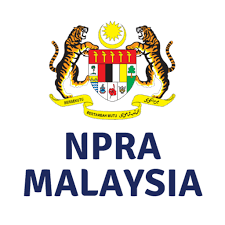
Drug Safety Alert 1: Risk of anaphylaxis associated with Guselkumab use
Guselkumab (Tremfya®), is an anti-interleukin-23 monoclonal antibody indicated for the treatment of adult patients with moderate to severe plaque psoriasis who are candidates for systemic therapy or phototherapy.
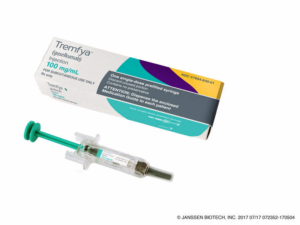
In October 2019, the National Pharmaceutical Regulatory Agency (NPRA) received a safety issue notification from the product registration holder of Tremfya®, Johnson & Johnson Sdn. Bhd. regarding the association of guselkumab with the risk of anaphylaxis.
Serious hypersensitivity reactions are a known safety risk for all biologics. Treatment with monoclonal antibodies may be associated with the development of antibodies against the therapeutic agent, which increases the chances of experiencing hypersensitivity reactions.
In the post-marketing surveillance of guselkumab, spontaneous adverse drug reaction reports of anaphylaxis and anaphylactic reactions have been received. Although anaphylactic reactions generally occur shortly (minutes to hours) after therapeutic monoclonal antibodies exposure, there were some serious hypersensitivity reactions reported to occur several days after guselkumab treatment, including cases with urticaria and dyspnoea. Based on the evaluation of these cases, anaphylaxis/anaphylactic reaction was determined to be a new adverse drug reaction and warranted an update to the product information of guselkumab. There were no adverse drug reactions pertaining to anaphylaxis reported for guselkumab from Malaysian case reports. However, there were a total of 3,042 case reports identified in VigiBase (WHO’s Global ADR database) with ADR-drug combination of anaphylaxis associated with guselkumab use, where three (3) adverse events were reported as anaphylactic shock.
Advice for Healthcare Professionals:
- Guselkumab continues to have a favourable benefit-risk profile for the approved indication.
- Advice patients to immediately seek emergency treatment if they develop signs of anaphylaxis, such as difficulty breathing, swollen face, swollen tongue, or throat tightness.5
- If serious hypersensitivity reactions such as anaphylaxis occur, treatment with Tremfya® should be discontinued and appropriate therapy should be instituted. The prescriber of Tremfya® must be informed.
- Please report all adverse events suspected to be related to the use of guselkumab to respective national health authority.
Drug Safety Alert 2: Kounis syndrome associated with Intravenous iron-containing products
The NPRA received information from the European Medicines Agency (EMA) on the association of intravenous iron-containing products with the risk of Kounis syndrome. Iron sucrose, iron dextran and iron isomaltoside are in the scope of EMA’s review.
Kounis syndrome is defined as acute coronary syndromes with mast cell and platelet activation caused by allergic, hypersensitivity or anaphylactoid reactions. It is not considered a rare disease, but it is a condition which is infrequently diagnosed clinically.
Based on all available evidence from clinical trials, post-market reports, and literature, EMA concluded that all product registration holders of iron-containing products under the review would need to include the risk of Kounis syndrome in their product information documents
Local case reports at NPRA national database
NPRA has received 162 reports with 368 adverse events, 322 reports with 755 adverse events, and 11 reports with 28 adverse events suspected to be related to iron sucrose, iron dextran and iron isomaltoside respectively. To date, no event related to Kounis syndrome has been reported locally.
Advice for Healthcare Professionals
- Advise patients to inform their doctor immediately if they experience chest pain, which could be a sign of a potentially serious allergic reaction.
- Be alert on the risk of Kounis syndrome associated with the use of intravenous iron-containing products.
- Consider the diagnosis of Kounis syndrome if patients simultaneously develop hypersensitivity reaction and acute coronary syndromes during or after intravenous iron therapy.
- Report all suspected adverse events associated with iron-containing products to the respective national health authority.
Drug Safety Alert 3: Reports of cytomegalovirus (CMV) infection or reactivation with Nivolumab use
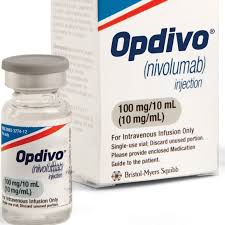
Nivolumab is a human immunoglobulin G4 (IgG4) monoclonal antibody (HuMAb) blocking programmed death receptor-1 (PD-1) which is indicated for the treatment of advanced melanoma as monotherapy in adults, or treatment of locally advanced or metastatic non-small cell lung cancer (NSCLC). While nivolumab facilitates the patient’s immune system to fight the tumour cells, it may also direct the immune system against other ‘healthy’ tissues and cause severe immune-related adverse events such as immune-related colitis.
The NPRA received information from the European Medicines Agency on reports of cytomegalovirus (CMV) infection or reactivation associated with the use of nivolumab. In a European review of spontaneous and clinical trial reports of nivolumab, there was a total of 20 serious cases of CMV infection or reactivation. From this total, there were two (2) cases of colitis associated with CMV infection or reactivation, one of which was fatal.
Based on the assessment made, EMA concluded that the benefit-risk balance of nivolumab remains favourable. However, the marketing authorisation holder of nivolumab is required to revise the existing warning on immune-related colitis to include CMV infection or reactivation in the product information.
Local case reports at NPRA national database
NPRA has received two (2) reports with three (3) adverse events suspected to be related to nivolumab use. No adverse event regarding CMV infection or reactivation has been reported locally.
Advice for Healthcare Professionals
- Advise patients to inform their doctor immediately at the onset of symptoms suggestive of colitis, such as diarrhoea, blood in stools or abdominal pain.
- In patients presenting with diarrhoea or colitis following nivolumab therapy, investigate possible causes by performing a stool infection work-up and CMV screening.
- In patients diagnosed with corticosteroid-refractory immune-related colitis, the use of an additional immunosuppressive agent should only be considered after other causes including CMV infection or reactivation are excluded.
- Report all suspected adverse events associated with nivolumab-containing products to the respective national health authority.
Drug Safety Alert 4: Risk of progressive multifocal leukoencephalopathy (PML) and hepatitis B virus (HBV) reactivation with carfilzomib
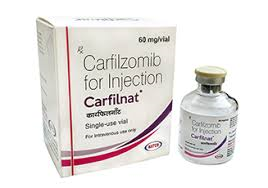
Kyprolis® (carfilzomib) is indicated in combination with dexamethasone or lenalidomide plus dexamethasone for the treatment of patients with relapsed or refractory multiple myeloma who have received one to three lines of therapy.
Risk of progressive multifocal leukoencephalopathy (PML)
carfilzomib may increase the risk of progressive multifocal leukoencephalopathy (PML). PML is a rare, often rapidly progressive demyelinating disease of the central nervous system (CNS) that is caused by the reactivation of John Cunningham virus (JC virus), a human polyoma virus.
- Healthcare providers are advised to monitor patients for any new or worsening neurologic, cognitive, or behavioural signs and symptoms that may be suggestive of PML as part of the differential diagnosis of CNS disorders.
- If PML is suspected, patients should be referred to a specialist and appropriate diagnostic testing should be performed. Discontinue carfilzomib if PML diagnosis is confirmed.
Risk of hepatitis B virus (HBV) reactivation
carfilzomib may increase the risk of hepatitis B virus (HBV) reactivation.
- Healthcare providers are advised to test patients for HBV infection before initiating treatment with Kyprolis®.
- For patients who are HBV carriers, prophylaxis with antivirals should be considered. HBV carriers who require treatment with Kyprolis® should be closely monitored for signs and symptoms of active HBV infection throughout and following the end of treatment.
- Consider consulting a specialist for patients who test positive for HBV prior to or during treatment with Kyprolis®. The safety of resuming Kyprolis® after HBV reactivation is adequately controlled is not known. Prescribers should weigh the risks and benefits when considering resumption of therapy in this situation.
Drug Safety Alert 5: Drug-induced liver injury (DILI) with pirfenidone
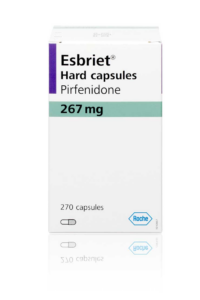
Esbriet® (pirfenidone) is an anti-fibrotic and anti-inflammatory agent indicated for the treatment of Idiopathic Pulmonary Fibrosis (IPF).
Elevations of liver enzymes is a expected safety concern for pirfenidone. However, treatment with pirfenidone has recently been associated with drug-induced liver injury (DILI) in patients with IPF. Serious hepatic adverse events including isolated cases with fatal outcome have been reported in the post-marketing setting, possibly due to idiosyncratic reactions to pirfenidone. The frequency of clinically relevant DILI is estimated as rare (≥1/10,000 to <1/1,000). Several measures should be considered in patients receiving pirfenidone, as follows:
- As the majority of the reported hepatic events occurred within the first few months of treatment, it is advised that hepatic transaminase and bilirubin levels be investigated:
- before treatment initiation
- at monthly intervals for the first 6 months of therapy
- then every 3 months throughout therapy
- Liver function should be promptly measured in patients with symptoms that suggest liver injury, such as fatigue, anorexia, right upper abdominal discomfort, dark urine, or jaundice.